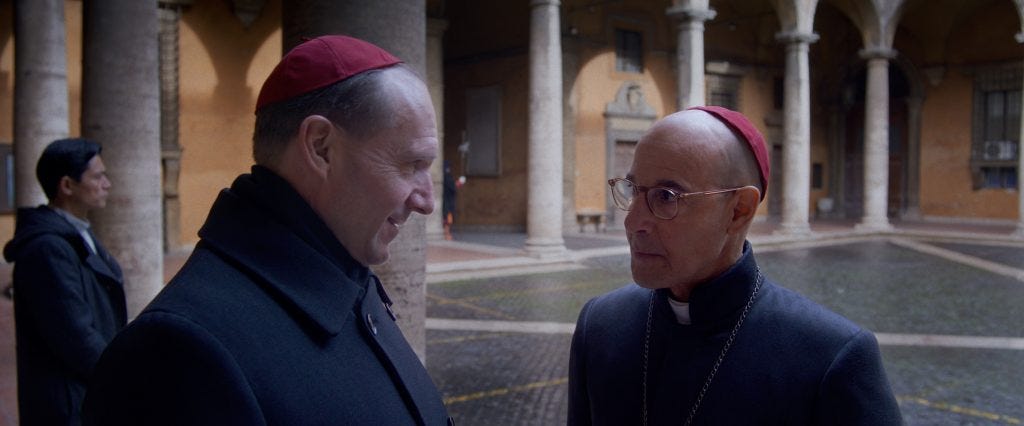Anxieties stand center stage in Edward Berger’s Conclave. Not in that unbearably neurotic way—see Charlie Kaufmann—but rather, in an almost welcomed perspective. This past year, Hollywood has made Jewishness and Transgenderism topics of bungled curiosity, exposing a vain lust for awards and praise. Now it’s Catholicism’s turn. Grappling with contemporary issues such as Pope Francis and the Church’s culture war caricatures, Conclave comes close to doing them justice but ultimately can’t shake its unavailing outsider perspective.
Ralph Fiennes stars as Vatican Dean, Cardinal Lawrence, our audience surrogate through a storm of spiritual crisis. A cast of ideological foils joins him: Stanley Tucci as Cardinal Bellini, a defeatist progressive; John Lithgow as Cardinal Tremblay, a corrupt moderate; and their two staunchest opponents—Cardinal Tedesco, a vape-sucking Latin-Masser, and Cardinal Adeyemi, an unapologetically homophobic prelate from Nigeria.
I’m sure plenty a Catholic journalist have nitpicked Conclave’s depiction of Papal nomination the same way geeks scrutinize the cinematic translations of their favorite source material. I have no interest in that. What matters is the film’s exploration of spiritual anxieties and cultural truths—and on that front, the results are frustratingly mixed.
Conclave never trivializes faith nor religious virtue, but instead masquerades as spiritually-minded, only valuing the Church from a disinterested secular view. At times, this can border on fanfiction. This disingenuous approach breeds tepid melodrama, offering little of real substance to grapple with.
It’s a step above Netflix content—like a season of twist-filled television crammed into a two-hour runtime. Not awful, but inherently disposable, designed to fade from memory within a day.
One of the biggest shortcomings comes from a wasted Stanley Tucci, as Berger never quite knows what to do with his Bellini character. He wants us to cheer when he takes a stand against Tedesco’s Islamophobic spewing, yet just as quickly, he embodies modern leftist resignation—such as his ironic remark, “They should celebrate the first African Pope in the history of the Church,” only to immediately concede the Pope race in the face of corruption.
The Simpsons did two-party ridicule with its infamous banners: “WE’RE JUST PLAIN EVIL” for the right and “WE HATE LIFE AND OURSELVES… WE CAN’T GOVERN” for the left. Berger attempts something similar, positioning Cardinal Lawrence as our avatar of disillusionment within this political and social catastrophe. Yet he can’t resist framing Bellini as a socially hip Mr. Rogers, too enamored with the reactionary Latin-Mass right to confront his own movement’s failings with equal honesty.
The most honest (and hilarious) depiction of holy men remains the Coen Brothers’ A Serious Man, with its trio of unhelpful rabbis—stand-ins for Job’s well-meaning but misguided friends. The Coens wrestle with Jewishness, embracing both its existential absurdity and spiritual weight without retreating into guilt or denial.
Conclave’s pre-Vatican II hardliner feels cut from the same archetypal cloth, but he comes from a filmmaker with little conviction or curiosity. Berger, despite not being Catholic, manages to flood the screen with enough guilt to make Martin Scorsese jealous.
And, of course, Conclave’s boldest play comes in its finale, when Cardinal Benitez (Carlos Diehz)—portrayed as saintly and incorruptible as JC himself—is unexpectedly elected Pope. The twist feels unearned, especially given that Benitez was virtually unknown to the Church just days prior. But the real shock comes moments later: in a final soap-opera flourish, we learn Benitez is intersex—thought to be male but born with both reproductive organs, a fact previously unknown to him due to his impoverished upbringing.
The film closes on a cautiously optimistic Cardinal Lawrence, resigned to whatever comes next, as we’re left with an Alana Moore-style Watchmen ending—it’s up to the world’s reaction now.
Unfortunately, I think the average person would tell you World War 3 would break out if someone intersexual took the papacy. I’m not here to condemn or condone that apocalyptic pessimism, but when that anxiety persists, this lazy everything will be okay mentality just drags us deeper into the cultural hellhole we’re already stuck in.
After the failure of his 1953 film I Confess—about a priest accused of murder who can’t prove his innocence due to the confessional seal—Hitchcock blamed audiences, saying it was too Catholic for them. Funny, considering Conclave features a scene where Cardinal Lawrence blatantly breaks that very seal to sway the election.
Maybe audiences would respond to a film with actual Catholic integrity. Even the still celebrated Wolf of Wall Street had this, for all its onscreen debauchery. Instead, we’re left with a film too detached to be intimate with its own material, yet arrogant enough to expect us to care.
Final Grade: C+







